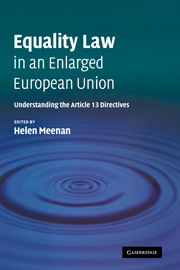Book contents
- Frontmatter
- Contents
- Preface
- Acknowledgements
- List of contributors
- Abbreviations
- Table of Cases
- PART I
- PART II
- 5 EU sex equality law post-Amsterdam
- 6 EU anti-racism policy; the leader of the pack?
- 7 Religion or belief; aiming at the right target?
- 8 Disability discrimination law in the European Union
- 9 Age discrimination – Of Cinderella and The Golden Bough
- 10 The ‘mainstreaming’ of sexual orientation into European equality law
- 11 Conclusion
- Index
8 - Disability discrimination law in the European Union
Published online by Cambridge University Press: 22 August 2009
- Frontmatter
- Contents
- Preface
- Acknowledgements
- List of contributors
- Abbreviations
- Table of Cases
- PART I
- PART II
- 5 EU sex equality law post-Amsterdam
- 6 EU anti-racism policy; the leader of the pack?
- 7 Religion or belief; aiming at the right target?
- 8 Disability discrimination law in the European Union
- 9 Age discrimination – Of Cinderella and The Golden Bough
- 10 The ‘mainstreaming’ of sexual orientation into European equality law
- 11 Conclusion
- Index
Summary
Member States are generally taking a civil rights approach to disability: from seeing people with disabilities as the passive recipients of benefits, they acknowledge the legitimate demands of people with disabilities for equal rights. Accordingly, they are making efforts to develop policies that aim at the full participation of people with disabilities into the economy and society. It implies equal opportunities, empowerment and active citizenship in mainstream society.
Introduction – the emergence of the rights-based approach to disability in the EU
The main purpose of this chapter is to assess the significance and future potential of the Framework Employment Directive in the specific context of disability.
A recent report by the European Foundation for the Improvement of Living and Working Conditions on the status of persons with disabilities in Europe makes for sober reading. It recalls that disability (which it combines with chronic illness) affects 17 per cent of Europe's general population and about 15 per cent of the working population. Disabled people are reported to have twice the rate for non-participation in the labour market as compared to persons without disabilities. The unemployment rate for persons with a severe disability is about three times the level for non-disabled persons. Workers with disabilities typically receive a lower wage than others and segregation is reported to begin at an early age ‘with children often pushed into parallel education networks or otherwise excluded from mainstream society’.
- Type
- Chapter
- Information
- Equality Law in an Enlarged European UnionUnderstanding the Article 13 Directives, pp. 231 - 277Publisher: Cambridge University PressPrint publication year: 2007
- 2
- Cited by



